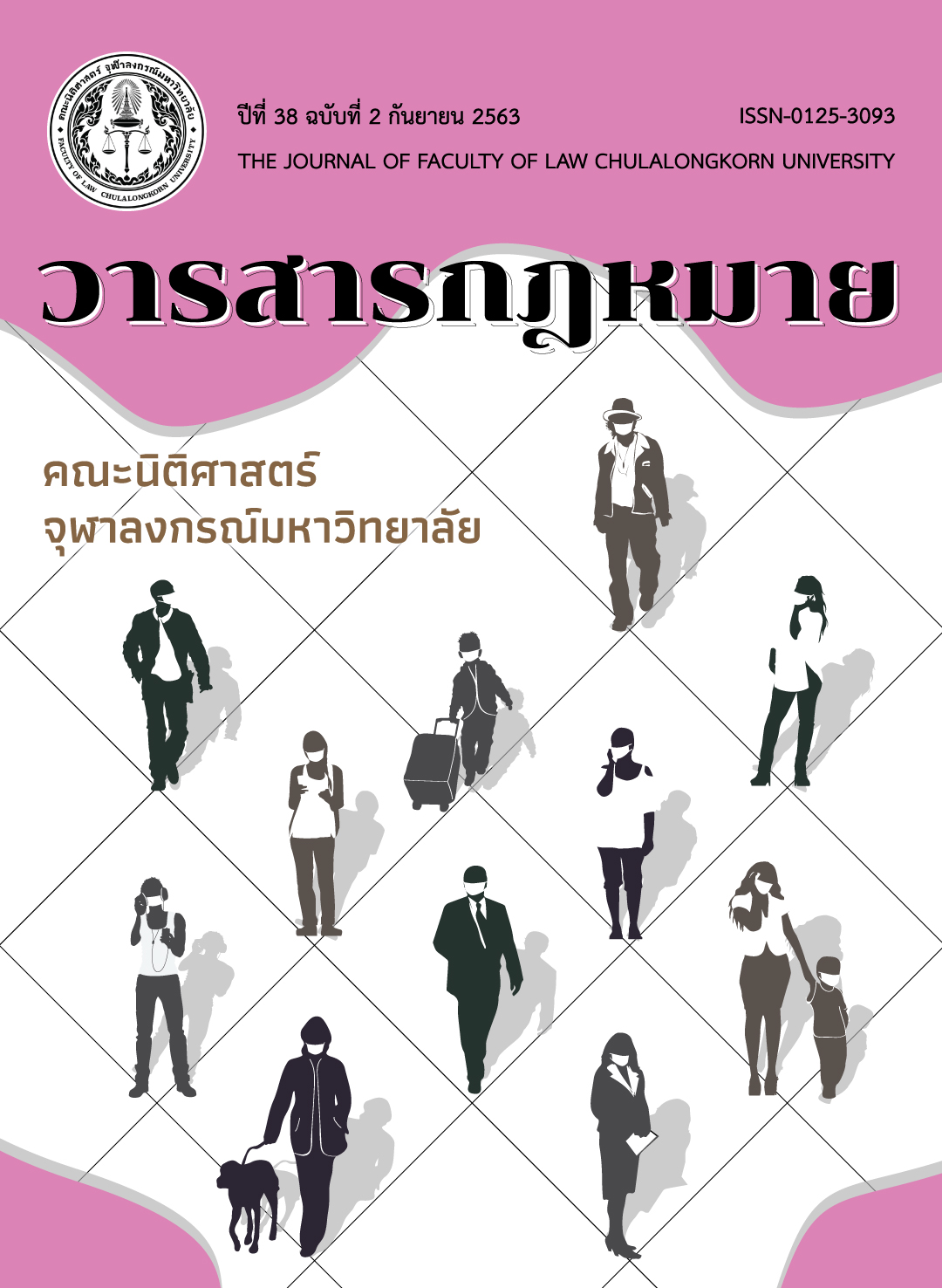ปัญหากฎหมายเกี่ยวกับสิทธิการเลือกเพศของบุคคลผู้มีภาวะเพศกำกวม
Main Article Content
บทคัดย่อ
แนวความคิดเกี่ยวกับเพศที่แบ่งเพศออกเป็น 2 เพศ คือ เพศชายและเพศหญิงนั้น ได้ส่งผลกระทบโดยตรงต่อบุคคลผู้มีภาวะเพศกำกวม เนื่องจากการผ่าตัดเพื่อเลือกเพศให้แก่เด็กผู้มีภาวะเพศกำกวมโดยไม่ได้รับความยินยอมนั้นทำให้เกิดการละเมิดสิทธิมนุษยชน ส่งผลกระทบต่อสิทธิขั้นพื้นฐานและการดำรงชีวิตของบุคคลผู้มีภาวะเพศกำกวม ด้วยเหตุนี้ หลายประเทศจึงเรียกร้องให้ยุติการผ่าตัดเลือกเพศโดยไม่ได้รับความยินยอมจากบุคคลผู้มีภาวะเพศกำกวม เป็นที่น่าสังเกตว่าประเทศไทยยังไม่มีมาตรการทางกฎหมายโดยเฉพาะในการคุ้มครองบุคคลผู้มีภาวะเพศกำกวม ดังนั้น เพื่อเป็นการคุ้มครองสิทธิมนุษยชนของกลุ่มคนเหล่านี้และเพื่อให้เป็นการสอดคล้องกับปฏิญญาสากลว่าด้วยสิทธิมนุษยชนที่ประเทศไทยเป็นภาคีสมาชิก กระบวนการในการผ่าตัดเลือกเพศของบุคคลผู้มีภาวะเพศกำกวมนั้นจะต้องได้รับความยินยอมโดยชัดแจ้งจากบุคคลผู้มีภาวะเพศกำกวม และต้องผ่านกระบวนการตรวจสอบอัตลักษณ์ทางเพศโดยแพทย์เฉพาะทาง การกำหนดกระบวนการเช่นนี้ก็เพื่อที่จะให้แน่ใจว่าการเลือกเพศของบุคคลผู้มีภาวะเพศกำกวมถูกต้องตรงตามเพศวิถีและอัตลักษณ์ทางเพศ
Article Details
ลิขสิทธิ์และเนื้อหาในเว็บไซต์ของวารสารกฎหมาย (รวมถึง โดยไม่จำกัดเฉพาะ เนื้อหา รหัสคอมพิวเตอร์ งานศิลป์ ภาพถ่าย รูปภาพ ดนตรีกรรม โสตทัศนวัสดุ) เป็นกรรมสิทธิ์ของวารสารกฎหมาย และผู้ได้รับการโอนสิทธิทุกราย
1. วารสารกฎหมาย ให้อนุญาตให้คุณใช้สิทธิอันไม่เฉพาะเจาะจงที่สามารถถูกถอนเมื่อใดก็ได้ โดยไม่มีค่าใช้จ่าย ในการ
- เยี่ยมชมเว็บไซต์และเอกสารในเว็บไซต์นี้ จากคอมพิวเตอร์หรือเครื่องมือสื่อสารผ่านเว็บบราวเซอร์
- คัดลอกและจัดเก็บเว็บไซต์และเอกสารในเว็บไซต์นี้บนลงคอมพิวเตอร์ของคุณผ่านระบบความจำ cache
- สั่งพิมพ์เอกสารจากเว็บไซต์นี้สำหรับการใช้ส่วนตัวของคุณ
- ผลงานที่ได้รับการตีพิมพ์โดยวารสารกฎหมาย จุฬาลงกรณ์มหาวิทยาลัย ถูกคุ้มครองภายใต้ Creative Commons Attribution 4.0 International License ซึ่งอนุญาตให้ทุกคนสามารถคัดลอก แจกจ่าย ดัดแปลง ส่งต่อ ผลงานได้ ก็ต่อเมื่อผลงานและแหล่งข้อมูลได้รับการอ้างอิงอย่างเหมาะสม
2. วารสารกฎหมาย จุฬาลงกรณ์มหาวิทยาลัย สงวนสิทธิ์ไม่อนุญาตให้คุณใช้สิทธิอื่นใดที่เกี่ยวข้องกับเว็บไซต์และเอกสารบนเว็บไซต์นี้ เช่น การคัดลอก ดัดแปลง เปลี่ยนแปลง ส่งต่อ ตีพิมพ์ แจกจ่าย เผยแพร่ จัดแสดงในที่สาธารณะ ไม่ว่าจะในรูปแบบใดก็ตาม ซึ่งเว็บไซต์หรือเอกสารบนเว็บไซต์ โดยไม่อ้างอิงถึงแหล่งข้อมูลหรือโดยไม่ได้รับอนุญาตเป็นลายลักษณ์อักษรจากวารสารกฎหมาย จุฬาลงกรณ์มหาวิทยาลัย
3. คุณอาจขออนุญาตที่จะใช้เอกสารอันมีลิขสิทธิ์บนเว็บไซต์นี้โดยการเขียนอีเมลล์มายัง journal@law.chula.ac.th
4. วารสารกฎหมาย จุฬาลงกรณ์มหาวิทยาลัย เข้มงวดกับการคุ้มครองลิขสิทธิ์อย่างมาก หากวารสารกฎหมาย จุฬาลงกรณ์มหาวิทยาลัยพบว่าคุณได้ใช้เอกสารอันมีลิขสิทธิ์บนเว็บไซต์นี้โดยไม่ถูกต้องตามการอนุญาตให้ใช้สิทธิ ดังที่กล่าวไปข้างต้น วารสารกฎหมาย จุฬาลงกรณ์มหาวิทยาลัยอาจดำเนินคดีตามกฎหมายต่อคุณได้ เพื่อเรียกร้องค่าเสียหายที่เป็นตัวเงินและคำขอชั่วคราวให้คุณหยุดการใช้เอกสารดังกล่าว ทั้งนี้ คุณอาจถูกสั่งให้ชดใช้ค่าใช้จ่ายใดๆ ที่เกี่ยวข้องกับการดำเนินการตามกฎหมายนี้
หากคุณพบเห็นการใช้เอกสารอันมีลิขสิทธิ์ของวารสารกฎหมาย จุฬาลงกรณ์มหาวิทยาลัย ที่ขัดหรืออาจขัดต่อการอนุญาตให้ใช้สิทธิดังที่ได้กล่าวไปข้างต้น โดยเชื่อว่าได้ละเมิดลิขสิทธิ์ของคุณหรือของผู้อื่น สามารถร้องเรียนมาได้ที่ journal@law.chula.ac.th


